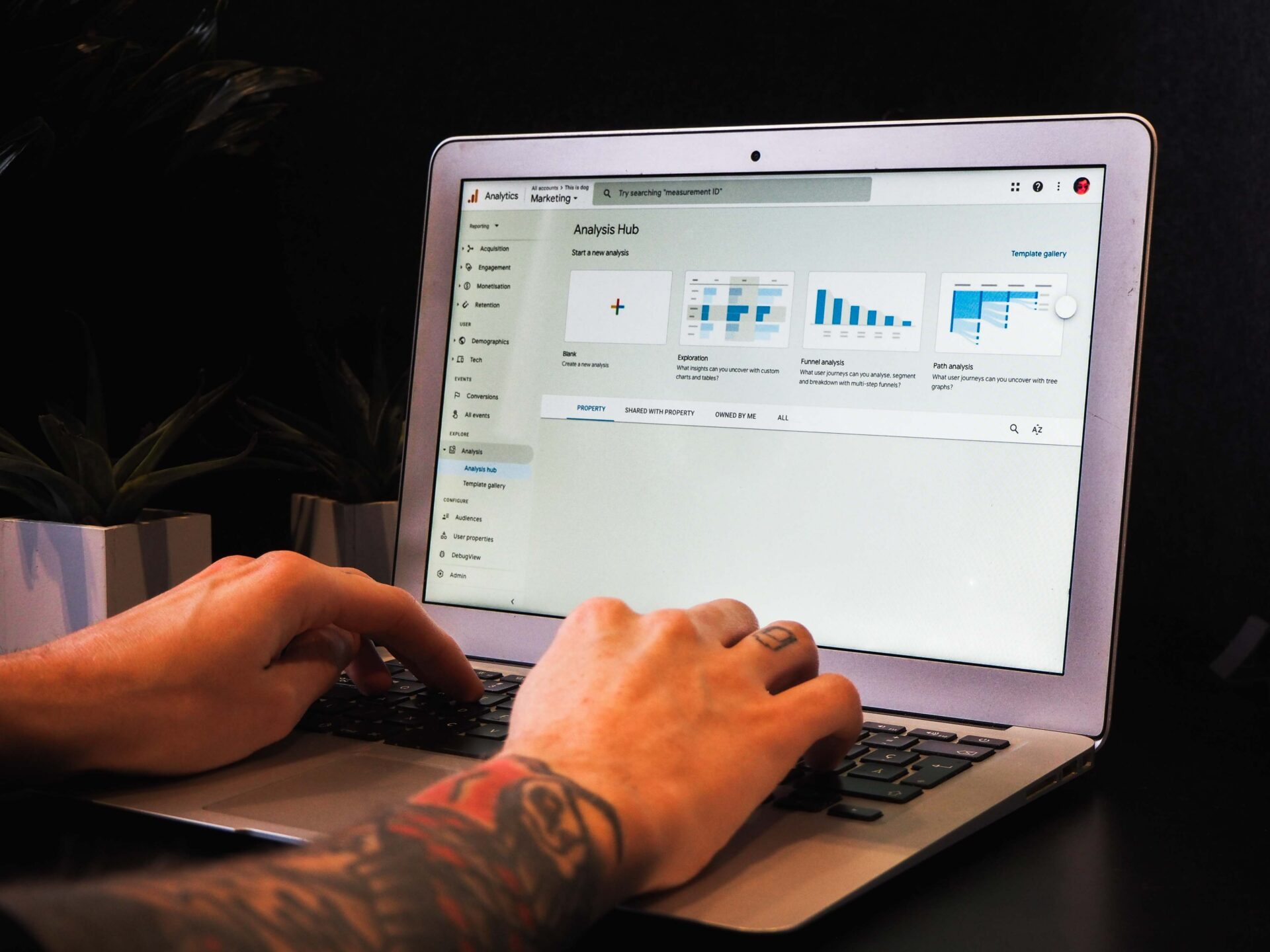When marketing evolved from longstanding, yet expensive methods like print and media advertising to more affordable digital means like email, social media and search engine marketing, business owners had unprecedented access to important data.
This is now not only the driving force behind effective marketing, but also successful business decisions.
Small business owners, in particular, can now use their access to this data to gain accurate and actionable insights to maximize their online presence, generate leads, increase revenue, and grow their businesses.
For many years, Google Analytics (often referred to as GA, Universal Analytics or UA) has been one of the most effective tools for providing businesses with this crucial data.
Although Google Analytics has long been the go-to tool for tracking website performance, it is now being replaced with an even more effective tool.
With the recent introduction of Google Analytics 4 (GA4), business owners and companies now have access to even more innovative features and valuable data.
In the following article, we’ll explore what GA4 is, highlight its key advantages over Google’s Universal Analytics platform, and how Results Repeat’s expert SEO team can help you harness its power to grow your business.
The Effective Of Google Analytics (GA) On Marketing
Before we turn the spotlight on Google’s latest analytics tool, it’s important to understand the role that its previous tool played in providing invaluable insights in marketing and business growth.
Google’s Universal Analytics was an important tool for companies and business owners for several reasons, including:
Website Traffic Analysis
With Google Analytics, businesses were able to easily access detailed information about the traffic coming to their websites.
It allowed them to track the number of visitors, their geographic location, the devices they were using, and how they found the website (through search engines, social media, referrals, etc.).
This data helped businesses better understand their audience and their preferences. This in turn enabled them to make more informed decisions to optimize their website and refine digital marketing strategies.
Performance Measurement
In addition to web traffic information, Google Analytics allowed businesses to measure the performance of their website and marketing campaigns.
This was accomplished by providing valuable insights into key metrics such as:
- Bounce Rate: The percentage of visitors who navigate away from a website after viewing only one page, without interacting further or exploring other pages within the site. In other words, it represents the number of visitors who “bounce” off the website without engaging in any meaningful interaction. A high bounce rate typically indicates that visitors are not finding what they are looking for or that the website content fails to engage and retain their interest.
- Average Session Duration: The average amount of time users spend on a website during a single visit or session. Essentially, it measures the length of time users stay engaged and active on a website. A higher average session duration generally suggests that users find the website is easy to navigate, its content interesting and are more likely to explore multiple pages or engage in interactive activities.
- Conversion Rates: The percentage of website visitors or users who take a desired action or complete a specific goal. The desired action can vary depending on the context and objective of the website, such as making a purchase, filling out a form, subscribing to a newsletter, or downloading an app. The conversion rate indicates the effectiveness of a website or marketing campaign in converting visitors into customers or achieving the desired outcome. A higher conversion rate generally signifies a more successful and persuasive user experience, while a lower conversion rate may indicate areas for improvement or optimization.
By analyzing these metrics, businesses were able to identify areas where their website or digital campaigns were potentially underperforming. With this information, they could take the necessary corrective actions to improve them.
Goal Tracking
Most businesses have specific goals for their website, such as increasing sales, generating leads, or driving newsletter sign-ups.
Google Analytics enabled them to set up and track these goals. By monitoring goal completions, they could assess the effectiveness of their marketing efforts and make data-driven decisions to optimize current and future strategies.
Content Analysis
Google Analytics also gave businesses an opportunity to understand which pieces of content on their website resonated with target audiences and drove engagement.
UA users could also analyze their site’s most popular pages, the average time spent on each page, and the path visitors took to access the website. This information allowed businesses to tailor their content to better meet their target audiences’ needs, improve the overall user experience, and potentially increase conversions.
Ecommerce Tracking
For online stores, Google Analytics offered ecommerce tracking features that enabled them to monitor sales, revenue, average order value, and other crucial e-commerce metrics.
This data helped evaluate the performance of their online store, identify successful products, adjust their pricing and promotions, and enhance the overall shopping experience for visitors and customers.
Advertising ROI
For businesses running online advertising campaigns, Google Analytics integrated with platforms like Google Ads to provide valuable insights into their ad performance.
Paid advertisers could track ad clicks, conversions, and revenue generated, allowing them to measure the return on investment (ROI) of their advertising spend. This information allowed businesses to allocate their advertising budget effectively and optimize their campaigns for better results.
Overall, Google Analytics offered businesses a comprehensive understanding of their website’s performance, audience behavior, and marketing efforts. By leveraging this data, they could make informed decisions, identify growth opportunities, and continuously improve their online presence to drive business success.
As powerful and beneficial as GA was to businesses, GA4 aims to take those data-generating tools to the next level.
Understanding Google Analytics 4 (GA4)
So what is GA4, exactly?
Google Analytics 4 is the next generation of Google’s analytics platform.
Like its predecessor, it’s designed to help businesses gain a deeper understanding of user behavior and deliver more comprehensive insights across various devices and channels. It provides a unified approach to data measurement and analysis, offering a more holistic view of the customer journey.
Key Advantages of GA4
If it essentially does the same thing as GA, why do businesses need it?
First and foremost, standard Universal Analytics was replaced by GA4. As of July 1, 2023, all existing UA properties stopped processing data.
Additionally, GA4 offers an array of new features and benefits that will provide businesses with even more data and insight to enhance the effectiveness of their websites and digital marketing efforts.
Some of GA4’s advantages include:
Enhanced Cross-Device Tracking
With GA4, businesses can now track user interactions across multiple devices, allowing them to understand how their customers engage with their brand across desktops, mobile devices, and tablets.
This valuable information provides insights into the effectiveness of marketing efforts and helps optimize user experiences across different platforms.
Event-Based Data Collection
Unlike UA, GA4 focuses on event-based tracking.
This allows businesses to collect granular data about specific actions users take on their website or app.
This shift away from the session and pageview-based tracking model of Universal Analytics enables deeper insights into user behavior, such as clicks, video views, file downloads, and form submissions.
Businesses can leverage GA4’s data to optimize conversion funnels and improve overall user engagement.
Smarter Machine Learning and Predictive Insights
GA4 integrates Google’s advanced machine learning capabilities to provide businesses with advanced insights into their customers’ behavior patterns and trends.
By leveraging AI-powered analytics, businesses can uncover valuable audience segments, predict user behavior, and make more data-driven decisions to enhance their marketing strategies.
Enhanced Data Analysis, Reporting and Visualization
Another key benefit of GA4 is that it provides an improved user interface and data visualization capabilities.
The platform offers more advanced analysis tools and reports, including the ability to create custom reports and perform in-depth exploration of data. The updated interface makes it easier to understand and interpret analytics data such as website performance, user demographics, and conversion rates.
Deeper Integration with Google Ads
For businesses with paid ad campaigns, GA4 offers seamless integration with Google Ads.
This integration allows them to easily analyze the performance of their Google Ads campaigns within the analytics platform. They can gain insights into how their ads contribute to user behavior, conversions, and revenue. With this insight, they can more effectively optimize their advertising efforts for better results.
Enhanced Ecommerce Tracking
For businesses with e-commerce operations, GA4 offers improved tracking and analysis capabilities.
It includes features like enhanced product measurement, customizable funnels, and more granular attribution modeling. This allows GA4 users to gain deeper insights into online sales performance and revise their ecommerce strategies accordingly.
Greater Privacy-Centric Capabilities
To align business with the ever-changing privacy landscape and regulations, GA4 includes privacy-centric features like data deletion controls, simplified user consent settings, and enhanced data privacy options to ensure compliance with privacy policies.
This focus on privacy helps businesses build trust with their website visitors and customers while still providing valuable analytics insights.
Need Help With GA4?
As you can see, GA4 not only enhances the existing benefits of UA, it also adds an array of additional features to provide more effective and efficient solutions for collecting and analyzing data.
Yet, understanding and implementing GA4 may seem daunting if you’re a business owner with limited technical knowledge. This is where Results Repeat’s expert SEO team comes in.
As a trusted digital marketing agency, Results Repeat specializes in helping businesses navigate the complexities of GA4 and harness its power to drive growth.
Results Repeat’s knowledgeable SEO team can help you with your GA4 needs in the following ways:
GA4 Implementation
Results Repeat can seamlessly integrate GA4 into your website, app or both, ensuring accurate data collection and tracking.
Customized Reporting
Our expert team can create custom reports that are tailored to your business’ specific needs and provide actionable insights and recommendations.
Data Analysis and Optimization
We can analyze your GA4 data, uncover meaningful trends, and optimize marketing strategies to improve your digital marketing ROI.
Ongoing Support
Our team will not only show you how to use GA4 and its many features, they’ll also provide ongoing support to ensure you continue to understand and utilize GA4 effectively.
Reach Out To Results Repeat for GA4 Support
Google Analytics 4 offers business owners a powerful tool to gain valuable insights and make informed decisions.
With enhanced cross-device tracking, event-based data collection, smarter machine learning insights, and more customizable reporting, GA4 is a game-changer for digital marketing strategies.
Results Repeat’s expert SEO team is ready to assist you in navigating GA4, providing the expertise needed to unlock the full potential of this advanced analytics platform.
Embrace the power of GA4 and partner with Results Repeat to propel your business forward in the digital landscape.
Our team of experienced professionals is dedicated to providing tailored solutions to meet your specific needs and goals.
Remember, in today’s competitive online market, data-driven decision-making is crucial for success. With Google Analytics 4 and Results Repeat on your side, you can gain a deeper understanding of your audience, optimize your marketing efforts, and drive meaningful results.
Don’t miss out on the opportunity to harness the power of GA4.
Contact Results Repeat today and take your business to new heights with advanced analytics and expert guidance!




